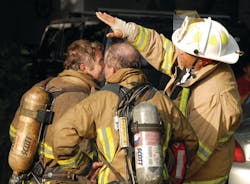I think one of the hardest things for a parent to do is to know when to let go and let the child spread their wings. I am in the process of this happening for the second time and I see many parallels to the fire service. As an officer it is your duty to develop your subordinates to the best of both your and their abilities.
This is going to be hard for some to relinquish control while still being in charge without some misgivings. Some may feel that they are the only ones that can perform the job to their satisfaction. Oftentimes those that are closer to the workflow may have a better handle on the issues and are able to arrive at the best solution. How many times have we seen something come from “on high” and shake our heads because it was so far from actual practice?
Delegating Responsibilities
Management books will tell you how a good manager delegates responsibilities. Let your crew have the opportunity to fly while you can assist them. Allowing the crew to make mistakes in a controlled setting is much preferable to making a mistake in the middle of a chaotic scene. Many business coaches will say not to make yourself irreplaceable, because you limit your upward mobility and the crew feels that their input is neither valued nor are they an important part of the team.
I have seen officers with a to-do list that filled the entire page, but when help was offered the answer was always “no thanks.” What messaged is received? Was it that input is not important and that they are the only one that can do anything? If so, they are sending the wrong message. Another point is what happens when you leave and take away the institutional knowledge gained throughout your career and never pass any of it on to your replacement? Why should they have to re-invent the wheel? Hopefully someone took you under their wing and gave you a good foundation to build on. Pass on this knowledge while you can. Your replacement will thank you for letting them hit the ground running. The first day promoted is not the ideal time to find out how little you know.
An important part of crew resource management is realizing that:
a) You are not an expert at everything, and
b) Others have skills that they can bring to the table.
The team synergy is stronger than any one individual, regardless of rank. Delegating responsibility can help your crew appreciate your job while helping them to grow in their career. Don’t be offended if someone comes up with a better idea than yours. Praise them and value the skills of your people. Utilize your people, but don't abuse them. They can make you look good or they can make you look bad. I remember hearing about a supervisor who felt challenged by the informal leader of a cohesive shift. Instead of seeing this as a gift, they saw this negatively and wasted a valuable resource. The supervisor could have made their job easier by co-opting someone that already had the ear of the shift. It is easier to bring one person on board versus trying to reach a consensus with the whole station.
Communicating Needs and Expectations
One of the key points in this process is the need to communicate your goals while letting the project be completed by others. Have the goals restated in their own words to ensure they are understood. If the goals are not communicated, the crew will not know which direction to go. I remember a pastor saying one Sunday that it was better to be going full speed in reverse instead of drifting aimlessly stuck in neutral. He said at least you knew that you were headed in the wrong direction and needed to change course. You cannot be angry at the shift for your inability to set the goals, nor should you get your underwear in a bunch if they step up and try to determine their own destiny.
If the project takes an unexpected turn or the result is not what was expected, now is the time to look at yourself and see if adequate resources and guidance were given. Did you pick the best person for the task? Would you really expect the rookie to write a procedure describing how to do a PM check on an aerial ladder? Instead pair the rookie with a veteran driver and have them work together. If not, you need to share the blame and get the project back on course.
Use this as an opportunity to put on your coach’s hat and point out the positives as well as how your expectations were not met. Do not use this as an excuse to micromanage by putting corners on the wheel and expect it to roll smoothly. Look at the times when mistakes have had an unexpected result that was better than the original goal. Kevlar and safety glass are two accidental discoveries that are now commercial successes.
My wife has told me numerous times that it is not what you say but how you say it. Also be aware that sometimes not saying something also speaks volumes louder than any words. Be encouraged that your crew had enough initiative and intelligence to recognize a problem and try and provide a solution. Also look into yourself and see if you failed your crew. No one is infallible and despite your best efforts you will make mistakes. Own up to them. Don’t blame others for your shortcomings. Use this as an example to grow. The road of life has bumps and setbacks. How you deal with them is what builds character.
As you can see in the examples above there are officer-to-firefighter and adult-to-adult relationships. This is no different than the parent-to-child relationship. Be the best parent you can be to your family and help them grow, but also know when to let them fly. If you don’t feel that your crew will make the right decisions without you, maybe your parenting skills need a tune-up.
In closing, while many of these have been said before, I feel they are still worth repeating.
- Value your people
- Praise in public, criticize in private
- Realize that no one is perfect.
- Use mistakes as a learning and teaching tool
- There will always be someone smarter than you. Get over it.
- Give credit where due
- And a personal favorite, work smarter, not harder.
JIM MILBY is a lieutenant with the Anne Arundel County, MD, Fire Department. He started in the fire service in the 1980s's and was hired as a career firefighter in 1990. Milby has been a member of the county's special operations team for 20 years.You can contact Milby by e-mail at:[email protected].
About the Author

Jim Milby
Jim Milby is a lieutenant with the Anne Arundel County, MD, Fire Department. He started in the fire service in the 1980s's and was hired as a career firefighter in 1990. Milby has been a member of the county's special operations team for 20 years. You can contact Milby by e-mail at:[email protected].
